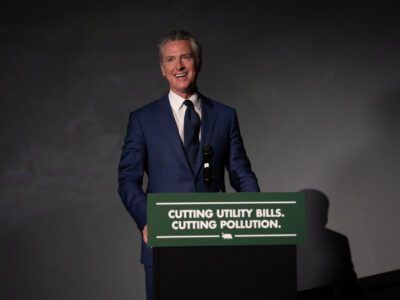ALEC’s Battle for Dirty Energy
Climate Progress has a very interesting post about ALEC’s activities in the energy area. You may remember ALEC as the corporate supporter of the “stand your ground” laws that allow you to kill someone who seems threatening when it would be just as easy to walk away. ALEC now has its guns aimed at state renewable portfolio standards. I guess this is not too surprising since its major supporters include Peabody Coal, the Koch Brothers, and Exxon Mobile, all of whom have a stake of one kind or another in dumping carbon into the atmosphere.
ALEC stands for “American Legislative Exchange Council,” which sounds very innocuous. Of course, these days, an innocuous, public-spirited name is almost always a cover for some nefarious special interest group. Nobody ever calls themselves “the Committee to Increase Corporate Profits” — American Legislative Exchange Council sounds much better. The same is true for another opponent of renewable portfolio standards, Americans for Tax Reform — a Grover Norquist outfit that might be more properly called “Americans for Decreasing Government Services and Increasing Inequality Which We Hope Will Stimulate the Economy.”
By the way, ALEC is also talking about creating an “energy freedom” index. Energy freedom, of course, consists of the freedom to use whatever energy source you want, regardless of how much harm it causes. I hear that anti-renewable forces are now talking about the need to defend “traditional energy” — which I guess is an effort to portray today’s oil and coal corporations in the flickering light of the home fireplace.
At one level, these euphemistic names are harmless, but they are part of a growing campaign to obfuscate policy disputes by concealing the players, mislabeling the issues, and carpet-bombing the Internet with dubious claims from “experts” that would not withstand peer review or even serious fact-checking. To some extent, it doesn’t event matter whether anyone believes those claims. Even if they aren’t believed by anyone except ideologues, they confuse issues and make it more difficult for the public to locate valid information in the fog of special-interest advocacy. Similarly, phony organizational names make it harder to identify old-fashioned greedy special interests or ideological zealots as opposed to groups representing relatively neutral “good government” perspectives.
All of that makes it hard for the public to figure out what’s going on. Which of course is the point.
Reader Comments
2 Replies to “ALEC’s Battle for Dirty Energy”
Comments are closed.






Well said. Should be called the ability to obfuscate age instead of the information age, and the obfuscation highway. Consuming resources sequestered in food sheds of forests, grasslands, or marshes, through imposed legal structures over water and land, creates technologically unbridgeable disease chasms. Friar Tuck and the maid Marian got it- google needs to figure it out.
Well said. Should be called the ability to obfuscate age instead of the information age, and the obfuscation highway. Consuming resources sequestered in food sheds of forests, grasslands, or marshes, through imposed legal structures over water and land, creates technologically unbridgeable disease chasms. Friar Tuck and the maid Marian got it- google needs to figure it out.